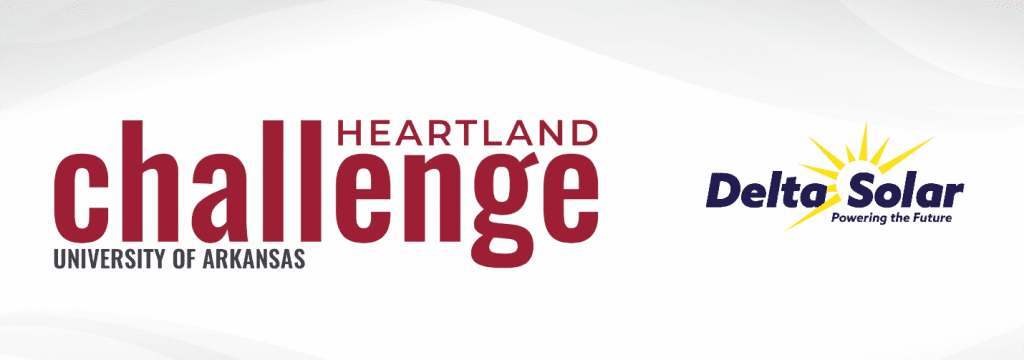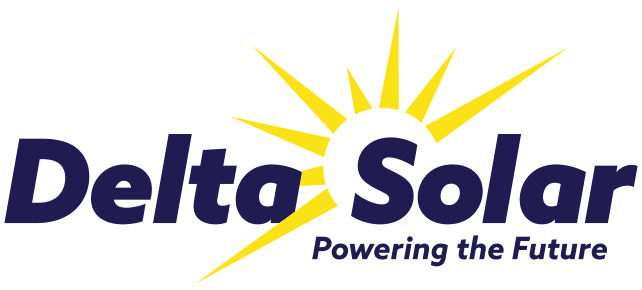
It’s easy to draw parallels between what we do at Delta Solar and what the Office of Entrepreneurship and Innovation (OEI) at the University of Arkansas are doing, as we share a common goal: we both want to see novel science and technology flourish and young minds continue to create – in whatever form that takes. The Heartland Challenge is a startup competition for student-led ventures that provides an opportunity for our next generation entrepreneurs to share their vision with an opportunity to win prizes and grow their networks.
What is the Heartland Challenge?
Not familiar with the competition? The Heartland Challenge is a competition organized by the University of Arkansas Office of Entrepreneurship and Innovation with the goal of simulating the real-world experience of pitching a high-growth business venture and raising the capital needed to get it off the ground. This not only provides students with valuable experience that will help them in future entrepreneurial roles, but it also provides them with skills and networking opportunities that will benefit them regardless of their ultimate career path.
Of course, while this is a fantastic opportunity for everyone involved, it’s not just about the experience and connections. After all, it is a competition. Eligible student-created businesses go head-to-head for significant cash prizes, with first place taking home $50,000 to advance their venture.
Our Role in the Challenge
Now, where do we come into all of this? From the beginning, we at Delta Solar have had the future in mind. The energy sector is experiencing major changes. The innovation cycle typical to semiconductors has been imposed onto an industry that is used to thinking in decades. One of our founders, UA alumnus and STEM education advocate Doug Hutchings, always points out that this rapid technological advancement creates outsized opportunities for energy consumers and the entrepreneurs who focus on adding value. Delta Solar works to continuously push the boundaries of innovation and utilize the best technologies for each project.
In fact, Doug’s entrepreneurial journey began at the University of Arkansas in their new venture development courses. This ultimately led to $317,500 in non-dilutive funding to launch their business, and more importantly, it allowed him to build a strong network across the country. Delta Solar, like Doug’s other ventures, would not have been possible without the experience gained from going through startup competitions like the Heartland Challenge. We recognize that thorough, innovative science and boundary-pushing technology are the way to a better future for all of us and we want to reward students who work toward that goal through long-term enterprises.
We keep a fairly skinny marketing budget at Delta Solar in an effort to keep costs as low as possible for our customers but investing in the next generation of entrepreneurial talent was a no-brainer for us. So, we decided to throw our hat in the ring and developed the Delta Solar Innovation Award. We hope it will further inspire the change we want to see in the industry, scientific community, and the world at large by awarding the prize to the team that pitches the most groundbreaking and community-supporting business venture. As to be expected, we were extremely excited to see what the semifinalists had to offer and are proud to be a sponsor of the Heartland Challenge.
Award Winners
This year’s challenge featured 12 semifinalist teams from eight universities, with business projects ranging from medical advances to sustainability technologies. With ideas that fundamentally transform broken systems, these students demonstrate the best of entrepreneurial thinking.
While we think that all of the teams had fantastic business ideas, we’re especially excited about the winner of the Delta Solar Innovation Award, Urogix from Washington University in St. Louis. Urogix is working on an implantable device for the treatment of benign prostatic hyperplasia (BPH). Their minimally invasive solution is projected to be cost-effective, avoid complications, and encourage patients to consider surgery rather than relying on medications. Urogix is currently working on the device’s production and hopes to submit a 510(k) to the FDA by 2022.
We are thrilled to be able to play a small roll in supporting the Urogix team in their mission, and we look forward to tracking their progress as they work to improve health outcomes for the 30 million patients who annually deal with symptoms of BPH!
